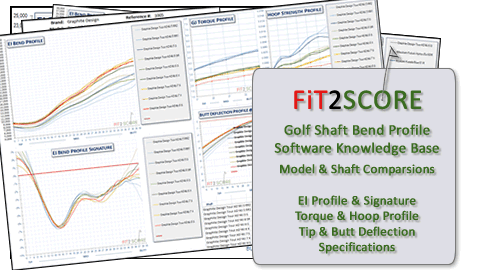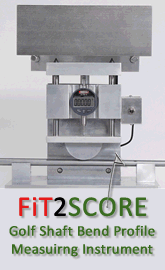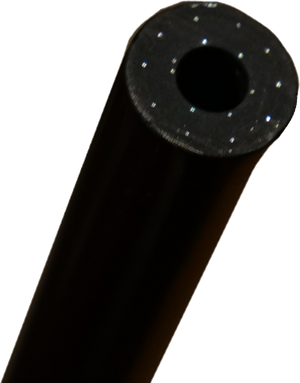Mitsubishi Tensei Pro Red Golf Shaft Review
By Russ Ryden, Fit2Score, A Dallas Fort Worth Club Fitter & Club Maker
Highlands Performance Golf Center, Carrollton Texas
![]()
The last profile added to the Mitsubishi Chemical Tensei Pro family of driver shafts is the Tensei Pro Red. Like the other Tensei Pro driver shafts it has a carbon Fiber Kevlar woven material place just below the hands. As you can see in the chart, this material substantially increases hoop strength in this area of the shaft. Hoop deformation in carbon fiber golf shafts is a function of wall thickness. The wall thickness in the butt end of a golf shaft is thin. Therefore the shaft deforms more. This has classical be called ovaling. Ovaling is thought to create dispersion. I have seen various materials use in this area to stabilize driver shafts. I have never seen as dramatic an effect on hoop deformation as I see in the Tensei Pros. Take note, the OEM shafts have only 4″ of this material which is little more than cosmetics. The Tensei Pro models have 11+” and the hoop deformation profiles are dramatically lower in this area.
To continue reading this section of the review, you must be registered at a higher level membership.
Russ






 The KuroKage XD has a dual wrap of Titanium Nickel prepreg in the tip as you can see in this image. Titanium Mickel (TiNi) is an elastic wire that immediately springs back to its original shape when stretched. It is used to increase the tip stability of the shaft. If a single wrap is good, as illustrated by multiple PGA Tour wins, Then a double wrap should be better. This is one of an array of that tip reinforcements used by Mitsubishi Chemical. The
The KuroKage XD has a dual wrap of Titanium Nickel prepreg in the tip as you can see in this image. Titanium Mickel (TiNi) is an elastic wire that immediately springs back to its original shape when stretched. It is used to increase the tip stability of the shaft. If a single wrap is good, as illustrated by multiple PGA Tour wins, Then a double wrap should be better. This is one of an array of that tip reinforcements used by Mitsubishi Chemical. The 

 This is the second release of a Diamana Thump Iron Shaft. The first release, in 2010, was eventually discontinued. At $160 per shaft, or $1280 per set of shafts, there was little interest. I am surprised to see the shaft again being offered. Perhaps PXG’s success at selling uber expensive irons demonstrated there is a market for ultra premium irons.
This is the second release of a Diamana Thump Iron Shaft. The first release, in 2010, was eventually discontinued. At $160 per shaft, or $1280 per set of shafts, there was little interest. I am surprised to see the shaft again being offered. Perhaps PXG’s success at selling uber expensive irons demonstrated there is a market for ultra premium irons.